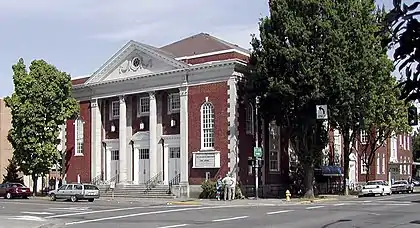The Shedd Institute
The John G. Shedd Institute for the Arts (or The Shedd Institute, and locally known simply as The Shedd), is a performing arts company, cultural arts center, and community music school in Eugene, Oregon, United States. The Institute has three performance venues, various community meeting rooms, and extensive music education facilities. It presents annually an array of culturally diverse festivals, concert series and educational programs that focus on, but are not limited to, American music.

History
The Shedd Institute was founded in 1991 under the name Oregon Festival of American Music as a thematically based summer orchestral pops festival dedicated to the championship of American classical music. In 1993 the Festival was designated as a Resident Company of the Hult Center for the Performing Arts. It established a community music institute in 1995.
In 1997 the company shifted from its summer-only festival model and began year-round programming with the foundation of two additional performance initiatives, The American Symphonia and The Emerald City Jazz Kings. The American Symphonia, which was under the artistic direction of conductor James Paul from 1997–2006, was a classical music initiative dedicated specifically to the championship of post-1900 European art music written in the Western Hemisphere. The Emerald City Jazz Kings, founded and directed by trombonist and music scholar Stephen Stone, is a 16–22 member ensemble dedicated to the presentation of historic popular music from the 1910s through '60s, with an emphasis on big band jazz, swing, musical theater, and the American standard. In 1998 the company's eclectic August festival named jazz pianist and composer Dick Hyman as its jazz advisor, who joined James Paul at its artistic helm.[1]
By 1999 the Festival had added two more performance initiatives to its programming (its Now Hear This Presenting Series and the Twin Rivers Folklife Festival) and, with the continued expansion of its community music school, had begun a search for a building of its own. In July 2002 it moved into the former First Baptist Church in downtown Eugene (a 65,000-square-foot (6,000 m2) complex of performance, meeting and classroom spaces), which it named "The John G. Shedd Institute for the Arts" in honor of early 20th century Chicago businessman and philanthropist John G. Shedd, the great-grandfather of Festival co-founder and long-time patron and Director of Education, Ginevra Reed Ralph.
In 2004 the Festival official changed its name to the name of its building. It is commonly referred to as "The Shedd Institute" while the building is known simply as "The Shedd". It added two additional concert initiatives to its cultural service mix (The Magical Moombah, a musical vaudeville for kids directed by Judith "Sparky" Roberts, and its Shedd Presents series) and began rental of the facility to other regional, cultural and educational programs.
Performance programs
The Shedd Institute's performance division currently manages five concert series: Oregon Festival of American Music (an August Festival, founded in 1992, dedicated to the classic American Songbook), The Emerald City Jazz Kings (founded in 1997, the Institute's resident jazz and historic popular music ensemble), Shedd Theatricals (founded in 2002 to produce classical musicals and musical comedies from the 1920s to early 1960s), The Magical Moombah (founded in 2001), the Now Hear This cultural presenting series (founded in 2000), and Shedd Presents (founded in 2004).
Facilities
The Shedd Institute's facility is located on the corner of Broadway and High Street in downtown Eugene. Constructed in 1926, the building formerly housed the First Baptist Church of Eugene. A 65,000-square-foot (6,000 m2) building has two formal concert halls (the 825-seat Jaqua Concert Hall and the 175-seat Recital Hall), a multi-purpose 250-seat Great Hall, two dance studios, a library, and about 30 other community meeting rooms, classrooms and rehearsal spaces.
See also
References
- Campbell, Brett (2000). "Venues And Visionaries". In Holt, Kathleen; Brooks, Cheri (eds.). Eugene 1945-2000: Decisions That Made A Community. City Club of Eugene. pp. 368–369. ISBN 0-7388-4581-7.